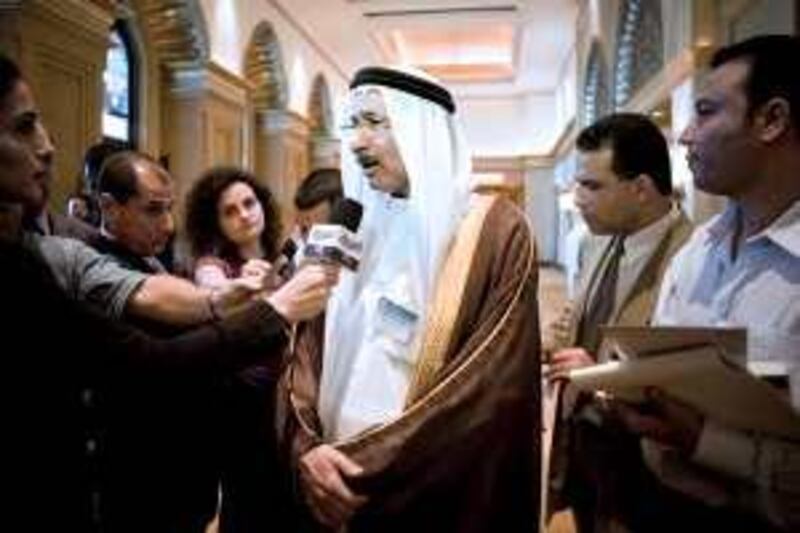The UAE economy may contract this year, according to the Central Bank Governor Sultan al Suwaidi, casting doubt on the extent of the country's recovery from the global recession. The country would either finish the year in negative territory or post a small growth, Mr al Suwaidi said on the sidelines of a meeting of Arab central bank governors in Abu Dhabi yesterday.
Asked what the prospects were for UAE GDP this year, Mr al Suwaidi said: "We don't give [GDP] figures but if there will be any growth it will be very small. It could be slightly negative or slightly positive. It's not going to be a big jump." The combination of the global financial crisis and a decline in oil revenues means the outlook for the UAE is not as good as last year when the economy expanded 7.4 per cent.
Mr al Suwaidi's comments follow remarks made earlier this month by Sheikha Lubna Al Qasimi, the Minister of Foreign Trade, who said the UAE was on track to achieve 3 per cent growth by the end of the year. Most UAE economists expect broadly flat economic performance this year. EFG-Hermes predicts a contraction of 4 per cent this year, while Credit Suisse sees a 2.5 per cent decline in the economy. HSBC offers a more optimistic view, forecasting growth of 1.5 per cent this year.
Sultan al Mansouri, the Minister of Economy, has previously said the country's economy would start to grow again by the fourth quarter of this year. The Central Bank would keep interest rates low until the economy began to show signs of recovery, Mr al Suwaidi said yesterday. Maintaining official interest rates at low levels is a key tool used by monetary policy makers to spur lending and revive economic growth.
"We are looking at the economy, how well it is doing - is it going up, keeping at a plateau, going down," Mr al Suwaidi said. "When we decide the economy is going up, I'm sure there will be thinking about interest rates." The Central Bank plans to launch its new mechanism for fixing the Emirates interbank offered rate (Eibor) on Thursday in an effort to lower interest rates it says are too high and which do not reflect the market. The regulator has rejigged the panel of 11 bank providers for Eibor in the hope it will help lower interbank lending rates.
Mr al Suwaidi said yesterday he expected these rates to drop "significantly". He also said the UAE would record low inflation this year. The latest inflation figures from the Ministry of Economy showed a 0.3 per cent increase in the price of a basket of consumer goods and services between July and the same period a year ago. In response to calls from some economists for the UAE to review the dirham's peg to the US dollar, Mr al Suwaidi said the UAE had no plans to cut the dirham free.
"The UAE will still be pegged to the dollar ? it is an international trade currency," he said. Dr Nasser Saidi, the chief economist at the Dubai International Financial Centre, this week said the dollar peg policy had led to a "perverse monetary policy" in the UAE. Tim Fox, the chief economist at Emirates NBD, said data the Central Bank released on Sunday showing a slowing in M1 money supply growth to 8.26 per cent last month compared with August last year reinforced Mr al Suwaidi's comments that the UAE had not yet recovered from the crisis.
"The data highlights there is still a long way to go before conditions in the UAE financial system begin to normalise," Mr Fox said. Mr al Suwaidi said 13 local banks were owed money by Saudi Arabia's Saad Group and Ahmad Hamad Al Gosaibi and Brothers, which are restructuring their debts after defaulting on payments. "We will announce the provisions that banks will need to take," he said, without naming the lenders. "There will be four classifications and for each we will set certain provisions."
tarnold@thenational.ae





